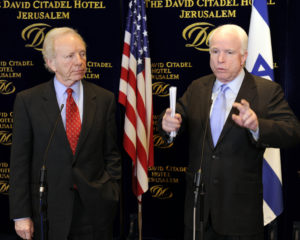
U.S. Senators John McCain (R-AZ), and Joseph Lieberman (I-CN), hold a press conference given in Jerusalem on February 25, 2011. [State Department photo/ Public Domain]
Despite having seen the horrors of war firsthand, Sen. John McCain nevertheless became one of the Senate’s most hawkish members, calling for war at all the wrong times. He joined the rabble-rousers to loudly encourage the failed missions in Iraq and Libya.
In the post-McCain era, Bandow encourages new leadership for GOP foreign policy and suggests a return to “an approach more consistent with the GOP’s purported commitment to limited government and individual liberties.” He writes (abridged):
The great tragedy of McCain’s life was his advocacy of war and military intervention at almost every turn. He backed the Afghanistan, Iraq, and Libya wars. He urged military strikes on North Korea and Iran. He visited Syrian insurgents to push U.S. intervention. He supported the Saudis’ brutal war against Yemen. He urged military action against Nigeria and Sudan. He pushed Washington to confront Russia over Georgia and lamented the lack of military options in Ukraine.
Thankfully he never reached the presidency. Lauded for his foreign policy expertise, his real talent was limited to proclaiming “bomb them” at strategic political moments.
Still, McCain may have been the single most influential of the Senate’s unofficial horsemen of the apocalypse
The good news is that there is no one to replace him. South Carolina Senator Lindsey Graham lacks McCain’s experience and gravitas. Unlike McCain, Graham cannot say that he knew war; rather, he knew a guy who knew war.
Senator Jim Inhofe is likely to take over the Senate Armed Services Committee chairmanship. He is traditionally conservative and hawkish, and believes the budget of the Pentagon should be without limit. But he is two years older than was McCain.
Majority Leader Mitch McConnell has held Republicans together for many dubious militaristic causes, perhaps none worse than having the armed services continue to act as a bodyguard for the Saudi royals.
McCain’s death creates an opportunity for new and improved Republican Party foreign policy spokesmen to emerge. Senators Rand Paul and Mike Lee and Congressman Justin Amash have been advocating an approach more consistent with the GOP’s purported commitment to limited government and individual liberties.
It’s time for all good Republicans to come to the aid of their party, and, more importantly, their country, by rediscovering what George W. Bush briefly described as a more “humble” foreign policy.
Read more here.
If you’re willing to fight for Main Street America, click here to sign up for my free weekly email.





